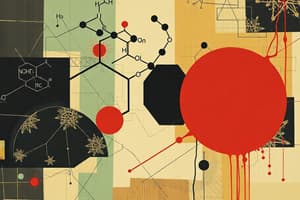Podcast
Questions and Answers
Which family of organic compounds includes hydrocarbons like hexane and decane?
Which family of organic compounds includes hydrocarbons like hexane and decane?
- Aromatics
- Alkanes (correct)
- Alkynes
- Alkenes
What is the characteristic feature of organic compounds?
What is the characteristic feature of organic compounds?
- Ionic bonding
- Covalent bonding (correct)
- Complexity
- High reactivity
What is the IUPAC system used for in organic chemistry?
What is the IUPAC system used for in organic chemistry?
- Naming alkanes (correct)
- Drawing organic molecules
- Identifying functional groups
- Predicting physical properties
What are the products of incomplete combustion of alkanes?
What are the products of incomplete combustion of alkanes?
What is the general formula for alkanes?
What is the general formula for alkanes?
Which of the following is the primary focus of organic chemistry?
Which of the following is the primary focus of organic chemistry?
How do the melting and boiling points of organic compounds compare to those of ionic compounds?
How do the melting and boiling points of organic compounds compare to those of ionic compounds?
Which type of bonding is characteristic of organic compounds?
Which type of bonding is characteristic of organic compounds?
What are some common products of organic chemistry used in medicine?
What are some common products of organic chemistry used in medicine?
Why are the properties of organic compounds different from those of ionic inorganic compounds?
Why are the properties of organic compounds different from those of ionic inorganic compounds?
Study Notes
Hydrocarbons and Alkanes
- Alkanes belong to the family of organic compounds that includes hydrocarbons such as hexane and decane.
- The general formula for alkanes is CnH2n+2, indicating they are saturated hydrocarbons.
Characteristics of Organic Compounds
- Organic compounds primarily consist of carbon atoms and typically contain hydrogen and may include oxygen, nitrogen, sulfur, or halogens.
- The presence of carbon-hydrogen (C-H) bonds is a characteristic feature of organic compounds.
IUPAC System
- The International Union of Pure and Applied Chemistry (IUPAC) system is used for naming organic compounds in a standardized way.
Combustion of Alkanes
- Incomplete combustion of alkanes produces carbon monoxide (CO) and carbon (soot), along with water (H2O).
Focus of Organic Chemistry
- The primary focus of organic chemistry is the study of compounds primarily made up of carbon and their properties.
Properties of Organic vs. Ionic Compounds
- Organic compounds generally have lower melting and boiling points compared to ionic compounds due to their molecular rather than ionic bonding.
- Ionic compounds typically exhibit strong electrostatic forces due to their lattice structure, resulting in higher melting and boiling points.
Bonding in Organic Compounds
- Covalent bonding is characteristic of organic compounds, involving the sharing of electrons between atoms.
Organic Chemistry in Medicine
- Common products of organic chemistry used in medicine include pharmaceuticals, vitamins, and other biologically active molecules.
Differences in Properties
- The differences in properties between organic compounds and ionic inorganic compounds stem from molecular structure, type of bonding, and the presence of functional groups in organic compounds.
Studying That Suits You
Use AI to generate personalized quizzes and flashcards to suit your learning preferences.
Description
This quiz covers the fundamental concepts of organic chemistry, including the characteristic features of organic compounds, drawing organic molecules, functional groups, alkanes, alkane nomenclature, and cycloalkanes. It provides an overview of the complex mixture of compounds found in petroleum, such as hydrocarbons like hexane and decane.




